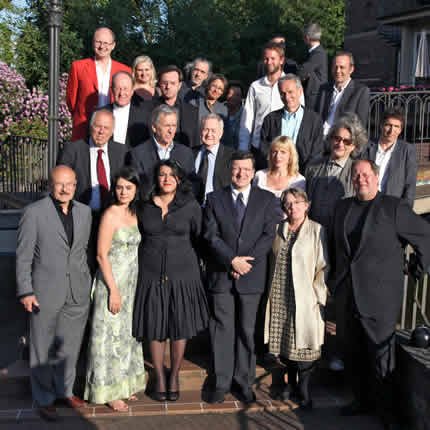 Twenty leading creators from the fields of film directing, writing, acting, production, distribution and education met with José Manuel Barroso, President of the European Commission, to exchange their views on the impact that images and cinema have on the identity of Europe and the way Europeans identify with their home continent. The President who had followed the Academy’s invitation to take the meeting under his patronage stated that the European Union is perceived by many citizens “mainly as an economic union,” and demanded: “We have to concentrate more on the emotional side of Europe.”
Twenty leading creators from the fields of film directing, writing, acting, production, distribution and education met with José Manuel Barroso, President of the European Commission, to exchange their views on the impact that images and cinema have on the identity of Europe and the way Europeans identify with their home continent. The President who had followed the Academy’s invitation to take the meeting under his patronage stated that the European Union is perceived by many citizens “mainly as an economic union,” and demanded: “We have to concentrate more on the emotional side of Europe.”
The meeting took place in the framework of the think tank “THE IMAGE OF EUROPE”, organized by the European Film Academy in Germany’s Ruhr Metropolis, European Capital of Culture 2010 with the support of Filmstiftung North Rhine-Westphalia and RUHR.2010. On the invitation of Wim Wenders and Volker Schlöndorff the participants discussed a variety of issues such as the growing damage done by piracy or the distribution problems outside the country of a film’s origin. As Wim Wenders pointed out, “there’s a new cinema by a young and optimistic generation that is moving freely across the borderless continent. Only their brilliant films don’t travel as much as the filmmakers do.”
It was unanimously agreed that film can play an enormous role in the way European citizens relate to their home continent and that a sensitivity for other cultures and countries keeps alive the spirit of diversity and creates an appreciation for the richness of European culture. As Volker Schlöndorff emphasized, it is time to “consider another lingua franca, the language of the images.”
The discussions have led the participants to call onto the member states of the European Union to include film, like literature, in the school curricula and to teach students who live in a world dominated by images, from primary school on, about the grammar of the moving image just as they are taught the grammar of the written word.
The EFA think tank’s participants, who included Constantin Costa-Gavras (France, MISSING, AMEN), Agnieszka Holland (Poland, EUROPA EUROPA), Marjane Satrapi (Iran/France, PERSEPOLIS), István Szabó (Hungary, MEPHISTO, COLONEL REDL), and Fernando Trueba (Spain, BELLE EPOQUE, LA NIÑA DE TUS OJOS) offered the European Commission their help in shaping the future of European cinema as part of European identity. They will act as ambassadors in their respective countries to spread the content and results of this meeting.
Wim Wenders and Volker Schlöndorff declared that the European Film Academy is ready to assume a major role in contributing to the development of a pan-European program for film education and to explore other paths and tools that may help shaping the “emotional side of Europe”.

